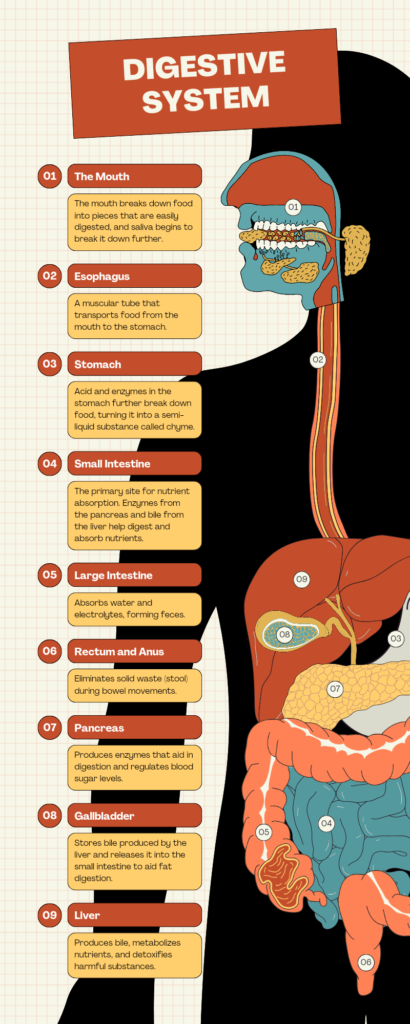 >
>The human digestive system is a complex network of organs that work together to convert food into nutrients that the body uses for energy, growth, and cell repair. It plays a crucial role in breaking down food, absorbing nutrients, and eliminating waste.
Key Components of the Digestive System
- Mouth
- The process of digestion begins in the mouth where food is chewed and mixed with saliva, which contains enzymes like amylase that start breaking down carbohydrates.
- Esophagus
- After chewing, the food moves through the esophagus, a muscular tube that connects the throat to the stomach. The process of peristalsis, a series of muscle contractions, helps move the food down.
- Stomach
- The stomach secretes acid and digestive enzymes, like pepsin, to break down proteins. The churning motion of the stomach further mixes the food, turning it into a semi-liquid called chyme.
- Small Intestine
- Chyme moves into the small intestine where the majority of digestion and nutrient absorption occurs. The small intestine consists of three sections: the duodenum, jejunum, and ileum. Enzymes from the pancreas and bile from the liver help digest fats, proteins, and carbohydrates.
- Liver and Gallbladder
- The liver produces bile, which helps break down fats. The bile is stored in the gallbladder and released into the small intestine as needed.
- Pancreas
- The pancreas secretes digestive enzymes into the small intestine that aid in the breakdown of carbohydrates, proteins, and fats. It also releases insulin to regulate blood sugar levels.
- Large Intestine (Colon)
- Any undigested food passes into the large intestine, where water and salts are absorbed. The remaining waste forms stool, which is then eliminated through the rectum and anus.
Digestive Process: Step-by-Step
- Ingestion: Food is taken in through the mouth.
- Digestion: Mechanical (chewing) and chemical (enzymes and acids) breakdown of food.
- Absorption: Nutrients from the food are absorbed into the bloodstream through the walls of the small intestine.
- Elimination: Waste products are expelled from the body.
Importance of the Digestive System
- Nutrient Absorption: Essential nutrients like carbohydrates, proteins, fats, vitamins, and minerals are absorbed through digestion, fueling the body.
- Waste Removal: The system eliminates undigested food and toxins, maintaining internal health.
- Metabolism Support: The digestive system supports metabolism by breaking down food into energy.
Common Digestive Disorders
- Acid Reflux: Occurs when stomach acid backs up into the esophagus, causing heartburn.
- Irritable Bowel Syndrome (IBS): A disorder affecting the large intestine, causing cramping, abdominal pain, and bloating.
- Gastroenteritis: Inflammation of the stomach and intestines, often due to infection, causing diarrhea and vomiting.
Tips for a Healthy Digestive System
- Eat a High-Fiber Diet: Foods like fruits, vegetables, and whole grains aid in digestion.
- Stay Hydrated: Water helps in the smooth passage of food and nutrients.
- Regular Exercise: Physical activity helps maintain healthy digestion by stimulating muscle contractions in the intestines.
- Avoid Processed Foods: High-fat and processed foods can slow down digestion.
The human digestive system is vital for overall health. By understanding how it functions, we can make informed choices about our diet and lifestyle, ensuring efficient digestion and nutrient absorption.
FAQs
- What is the main function of the digestive system?
The main function is to break down food into nutrients, which the body uses for energy, growth, and repair. - Where does most digestion occur?
Most digestion occurs in the small intestine. - What are common digestive problems?
Common issues include acid reflux, constipation, IBS, and diarrhea. - How long does digestion take?
The digestive process typically takes about 24 to 72 hours, depending on the type of food and the individual.
Let me know if you need this in a specific format, like HTML!


